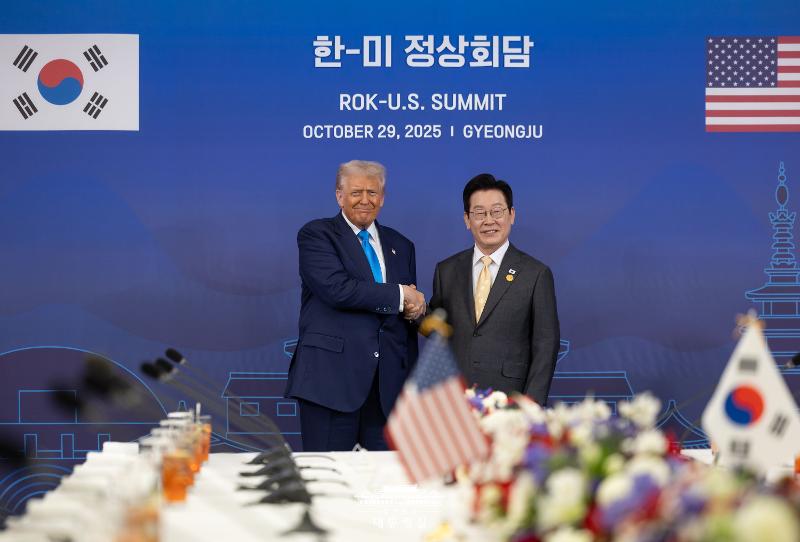
President Lee Jae Myung (right) on Oct. 29 shakes hands with U.S. President Donald Trump at Gyeongju National Museum in Gyeongju, Gyeongsangbuk-do Province. (Office of the President)
By Kim Seon Ah
President Lee Jae Myung and U.S. President Donald Trump on Oct. 29 reached a dramatic agreement on bilateral tariffs in their summit in Gyeongju, Gyeongsangbuk-do Province.
Under the deal, Korea will invest USD 200 billion of the pledged USD 350 billion in cash in the U.S. with an annual investment cap of USD 20 billion. Tariffs on Korea-made cars and parts are seen to be cut from 25% to 15% as early as next month, allowing more room for Korean exports to the American market.
Presidential Chief of Staff for Policy Kim Yong-beom that day said this in a news briefing after the summit.
Of the pledged amount of USD 350 billion, USD 150 billion will come through shipbuilding cooperation.
"The USD 200 billion cash investment will be disbursed under an annual limit of USD 20 billion depending on the progress of projects, so this is within the affordable range for our foreign exchange reserves," the official said. "To raise the possibility of recovering the principal investment, only commercially feasible projects that guarantee repayment of the principal and interest will be pursued, and until both are paid, Korea and the U.S. will share profits 50-50."
Domestic companies will take the lead in bilateral shipbuilding projects and the USD 150 billion figure includes guarantees as well as investments.
The agreement also cut the mutual tariffs of both countries to 15%, and those on cars and auto parts were also lowered to that rate. Pharmaceutical and wood products will be designated most-favored nation status while aircraft parts, generic drugs and natural resources not produced in the U.S. will incur no duties.
Tariffs on semiconductors will be equal to the level of those applied on Taiwan.
Talks on an additional opening of the agricultural market such as for rice and beef were also blocked.
sofiakim218@korea.kr